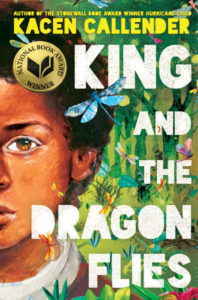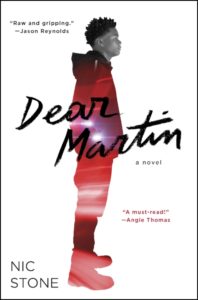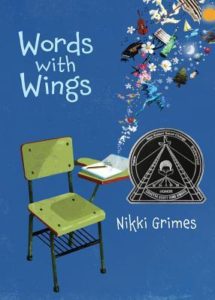 While OPB regularly interviews well-established and senior agents, editors, and publishers, we wanted to take a fresh look at the industry here at the start of 2021. With that goal in mind, we’re trying something different this month, which is why this month’s 2021 Industry Insider interview is with Jazmia Young, an agents’ assistant at Curtis Brown, Ltd. After two years of working alongside some of the top kidlit agents in the business, she’s got a lot of insight and perspective to share.
While OPB regularly interviews well-established and senior agents, editors, and publishers, we wanted to take a fresh look at the industry here at the start of 2021. With that goal in mind, we’re trying something different this month, which is why this month’s 2021 Industry Insider interview is with Jazmia Young, an agents’ assistant at Curtis Brown, Ltd. After two years of working alongside some of the top kidlit agents in the business, she’s got a lot of insight and perspective to share.
Let’s get started!
RVC: In the two years that you’ve been at Curtis Brown as an agents’ assistant, what has surprised you the most?
JY: The most surprising discovery is how much intuition goes into agenting. I’ve been in certain communications where I’ll have this gut feeling it’ll go my way, so I’ll be more forceful (in a nice way) with my negotiations or asking for more. Also, being organized and having an organizational system is beneficial for your sanity.
RVC: One of the agents you work closely with is Vice President Elizabeth Harding, who has a sizable list of clients. What impresses you most about Elizabeth?
JY: I can say, without a doubt, Elizabeth Harding is the most generous, caring, poised, and warmhearted person I’ve ever met. There’s nothing I can’t come to her with that she won’t have a solution to. She’s a wealth of knowledge and extremely generous with it.
RVC: Agreed, though I’m biased since she’s my agent.
JY: Before being hired, I was an intern for two other agents at Curtis Brown. I was told by a few people how kind Elizabeth was but I just didn’t know to what extent. I can say without a doubt, Elizabeth has been by far my best boss (aside from the other agent I work for, Katherine Fausset.)
RVC: What does it actually mean to be agents’ assistant? What’s your day-to-day work like?
JY: It’s safe to say any assistant’s workload heavily includes administrative work and mine’s no different. I process book contracts to make sure they’re executed and all respective parties have a copy. I answer client questions. I handle small contracts such as magazine, audio, and anthology rights, etc.
Besides the administrative work, I give my thoughts on client’s manuscripts, then Elizabeth and I will discuss our thoughts. That’s my favorite aspect of the process. My thoughts are really valued and as I go through these readings with her, I’ve honed in on the genres and subjects I’m interested in.
RVC: Which are?
 JY: Middle grade has definitely been one genre that has caught my attention. King and the Dragonflies and The Thing About Jellyfish are two of my favorite middle grade novels. There’s a sort of innocence to that age range that an author can play with, and, if done well, it entraps my heart and easily rises to the top of my “Favorite Books of All Time” list.
JY: Middle grade has definitely been one genre that has caught my attention. King and the Dragonflies and The Thing About Jellyfish are two of my favorite middle grade novels. There’s a sort of innocence to that age range that an author can play with, and, if done well, it entraps my heart and easily rises to the top of my “Favorite Books of All Time” list.
RVC: What’s the most difficult aspect of your work?
JY: I wouldn’t say this is a difficult aspect but learning when to take the next step in agenting has been a recurring issue for me. This is purely a personal issue–I find myself worrying about when/if I will take on clients. I’ve spoken to my colleagues and it seems like it boils down to a gut feeling. You’ll when you’ll know. Also, the time between being an assistant and being an agent is not a linear path, and that flexibility gives me comfort.
![]() RVC: You recently took on a role with the AALA (Association of American Literary Agents). How’d that happen, and why is the AALA so important?
RVC: You recently took on a role with the AALA (Association of American Literary Agents). How’d that happen, and why is the AALA so important?
JY: At the end of last year, Elizabeth came to me about a part-time position that she thought I’d be a good fit for. At first, I was a bit confused because here was my boss letting me know about a job offer. I thought I might be getting the boot. Lol!
But she explained to me the details of the job, what it has to offer, and what it meant to be the Administrative Assistant to the AALA (formerly known as the AAR). It’s a wonderful organization that really cares about educating agents on all aspects of publishing. My ties are deeply rooted with them. They have an internship program that I was a recipient of and that’s how I ended up interning at Curtis Brown. Then by way of that, I obtained my current position there. I really owe the start of my career to the AALA.
RVC: Let’s talk about how your career got started. You earned a two-year degree in liberal studies at Borough of Manhattan Community College. Did you have your eye on the publishing world at that point?
JY: I didn’t. I wasn’t sure what I wanted to do. All I knew was that I liked to read and write. So, I began taking courses in English, creative writing, and literature. Then I realized I liked my creative writing courses above the rest. After that, I knew that was the path to take.
RVC: That makes sense since you went on to complete a BA in creative writing from CUNY. What’s the most useful thing(s) you learned there about writing and stories that still helps you today?
JY: One thing that has stuck with me is to be receptive to the criticism of others. Someone is always going to see a text or a manuscript or a body of work differently than you. That doesn’t mean they’re wrong–it just means you have another perspective to consider. Not everyone is going to like what you like, and that’s definitely okay. I just feel more receptive to different angles and different ways of looking at someone’s writing.
RVC: After college but prior to Curtis Brown Ltd., you were an editorial intern at W.W. Norton (a publishing house) and then at Fletcher & Company (a boutique literary management company). What tips do you have for those interested in breaking into the publishing side of things like you did?
JY: I got both of those internships by way of my alma mater, The City College of New York. There, I was in the Publishing Certificate Program and one of the classes was an internship. That was my W.W. Norton position. For Fletcher, I was interviewed by them for the AALA internship program. I ultimately didn’t choose them to be my agency for the program but they needed an intern for a month and they asked if I could fill that spot, so I said yes.
There isn’t any clear-cut way of breaking into the industry but being genuine and taking opportunities you wouldn’t think of taking is a start. Networking is a big plus, too, and being part of a publishing program is a huge step in the right direction.
RVC: Compare the type of work you did at those places with what you do at Curtis Brown, Ltd.
JY: It’s completely different. As an intern, you don’t really feel as significant to the company as regular employees. I was doing the same thing each day and some days I didn’t do anything. But, at Curtis Brown I feel valued. Clients know me and are familiar with me. People trust me and give me responsibilities. I’m relied on. It feels good to be part of a company that values your time and effort.
RVC: What kind of career plans do you have? Are you going to be part of the next generation of agents? An editor? Something else entirely?
JY: I don’t have any three-year plan or five-year plan–I just set goals for myself. Then once I meet them, I go further. For now, I’d like to transition to taking on clients and really delve into agenting. But, for my publishing legacy, I hope to publish a variety of Black literature, both children’s and adult books by Black authors–specifically Black women.
 When I was younger, Nikki Grimes and Sharon M. Draper were staples on my bookshelf. The characters they wrote were so relatable and mirrored problems I had in my life. Now, Angie Thomas and Nic Stone are dominating with their writing. I hope to discover new amazing Black women writers.
When I was younger, Nikki Grimes and Sharon M. Draper were staples on my bookshelf. The characters they wrote were so relatable and mirrored problems I had in my life. Now, Angie Thomas and Nic Stone are dominating with their writing. I hope to discover new amazing Black women writers.
RVC: What do you think Elizabeth Harding would say if I asked her about you and your work?
JY: Elizabeth would say that I’ve been a huge help to her. She would boast about how insightful I am. Even though she’s completely too kind, I know she’d say having me as an assistant has been immensely helpful to her over these past two years.
RVC: What’s the #1 attribute of a good literary agent?
JY: Communication. Being honest with your client and knowing how to delegate between them and an editor is key. It takes a person with good communication skills to take their client’s comments into consideration and relay them to the editor concisely. I think once the communication can flow freely, the relationship can have longevity.
RVC: Whether they admit it or not, almost all literary agents have writing projects of their own. What are you working on?
JY: My writing is in a box in the back of my closet. I haven’t had the motivation to write. I used to write all the time and have so many notebooks full with scribbles of stories. I do have a recurring idea that floats in my mind consistently. My brother passed away four years ago. Often times I’m fearful that I’ll forget him. So, I desperately want to write his life but my emotions get in the way. I hope to revisit it soon.
RVC: Wow–that’s what we call a “heart book,” as opposed to what Jane Yolen calls a “head book” or a “pocket book.” Good luck with that!
JY: Thank you so much!
RVC: So, you’ve now seen like a million manuscripts. What advice do you have for budding picture book writers?
JY: I would say don’t submit an already finished book with illustrations. It stifles and pigeonholes the text. And I’m not talking about illustration notes but an actual fully composed book. Obviously, it’s different for illustrators who are also authors and other authors but if you can’t draw/illustrate, don’t.
Also, your text doesn’t always have to rhyme.
RVC: Do you see the #OwnVoices movement affecting the demographics of editors and agents as much as we see it affecting writers? How do you think this is going to affect the kidlit world over the next few years?
JY: Well, I would hope that it would have more of an effect on the publishing world. Honestly, I don’t think it’s enough for a white agent or editor to publish a BIPOC author. It feels like they’re checking off a box. They’re done their good deed for the BIPOC community and now they can pat themselves on the back.
No.
The real change comes when you make your team diverse. You hire more diverse editors and agents, then put those people in positions of power. Once that happens, it opens more doors for BIPOC authors and illustrators. I believe the disconnect happens when the editor or agent doesn’t find a text relatable or it is far from their realm of understanding. And, maybe, the text wasn’t meant for them to understand. That’s why having a diverse team is necessary. It pushes for more books to be published that isn’t just relatable to the people publishing it but to the people that want to see themselves more within them.
RVC: Okay, Jazmia—you’ve been waiting for it, and now the time has come. It’s the LIGHTNING ROUND! We’re firing off 100mph questions and hoping for equally zoomy answers. Are you ready?
JY: I was born ready, so I never have to get ready!
RVC: Best NYC comfort food: cronuts, cupcakes, burgers, or mac & cheese?
JY: Pizza.
RVC: What secret talent do you have that no one would suspect?
JY: I can bend my fingers backwards. It’s kind of unsettling.
RVC: If you had to play no-limit Texas Hold’em poker against your coworkers at Curtis Brown Ltd., who would be the most fearsome opponent(s)?
JY: Sarah Gerton. She’s super sweet, but I just know she’d have a good poker face.
RVC: Biggest writer-fangirl moment at work so far?
 JY: Elizabeth represents Nikki Grimes, and I used to read her books in middle school. When I met her, she gave me a huge hug. I couldn’t contain myself!
JY: Elizabeth represents Nikki Grimes, and I used to read her books in middle school. When I met her, she gave me a huge hug. I couldn’t contain myself!
RVC: If you could change one thing about the picture book world, what would it be?
JY: More depictions of BIPOC children in all situations by BIPOC authors and illustrators.
RVC: Let’s wave the OPB magic wand and WHAM, we’ve now got the Jazmia Young Literary Agency. What’s the motto?
JY: Your stories are safe here.
RVC: Thanks so much, Jazmia! I really appreciate the chance to get to know you and your work better!

